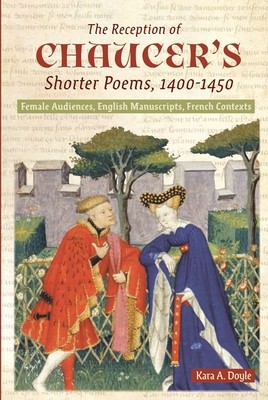
- We will send in 10–14 business days.
- Author: Kara A Doyle
- Publisher: Boydell & Brewer
- Year: 2021
- Pages: 306
- ISBN-10: 1843845903
- ISBN-13: 9781843845904
- Format: 15.6 x 23.4 x 1.9 cm, kieti viršeliai
- Language: English
- SAVE -10% with code: EXTRA
Reviews
Description
First full-length study of what the manuscript contexts can reveal about early reactions to Chaucer, and in particular his treatment of women.
Readers have disagreed for centuries about the way Chaucer represented female voices in his Hous of Fame, Parliament of Foules, Anelida and Arcite, Legend of Good Women, and Book of the Duchess; but little attention has hitherto been paid to the earliest manuscript contexts in which these poems appear -- a gap which this study aims to fill. It demonstrates that, even in unrelated manuscripts, Chaucer's earliest compilers repeatedly create for these poems a mixed-gender audience well versed in the lively French poetic conversation about the problem of a lack of interest on a woman's part: can she legitimately refuse the advances of her suitor on the grounds that men's fin'amor language cannot be trusted? By highlighting this French controversy and its echoes in the English poetry of Chaucer, Hoccleve, Lydgate, Roos, and others, these manuscript compilers construct a Chaucer who participates posthumously in an ongoing literary debate about female voice, female agency, female scepticism, and the false promises of male fin'amor suitors. This book also expands understanding of Chaucer's early reception by showing how the manuscript context of his shorter poems painted a French-centred, woman-friendly picture of his literary interests - a picture that some early printers would subsequently find difficult, and, in extreme cases, actively work to dismiss.EXTRA 10 % discount with code: EXTRA
The promotion ends in 21d.23:24:00
The discount code is valid when purchasing from 10 €. Discounts do not stack.
- Author: Kara A Doyle
- Publisher: Boydell & Brewer
- Year: 2021
- Pages: 306
- ISBN-10: 1843845903
- ISBN-13: 9781843845904
- Format: 15.6 x 23.4 x 1.9 cm, kieti viršeliai
- Language: English English
First full-length study of what the manuscript contexts can reveal about early reactions to Chaucer, and in particular his treatment of women.
Readers have disagreed for centuries about the way Chaucer represented female voices in his Hous of Fame, Parliament of Foules, Anelida and Arcite, Legend of Good Women, and Book of the Duchess; but little attention has hitherto been paid to the earliest manuscript contexts in which these poems appear -- a gap which this study aims to fill. It demonstrates that, even in unrelated manuscripts, Chaucer's earliest compilers repeatedly create for these poems a mixed-gender audience well versed in the lively French poetic conversation about the problem of a lack of interest on a woman's part: can she legitimately refuse the advances of her suitor on the grounds that men's fin'amor language cannot be trusted? By highlighting this French controversy and its echoes in the English poetry of Chaucer, Hoccleve, Lydgate, Roos, and others, these manuscript compilers construct a Chaucer who participates posthumously in an ongoing literary debate about female voice, female agency, female scepticism, and the false promises of male fin'amor suitors. This book also expands understanding of Chaucer's early reception by showing how the manuscript context of his shorter poems painted a French-centred, woman-friendly picture of his literary interests - a picture that some early printers would subsequently find difficult, and, in extreme cases, actively work to dismiss.

Reviews